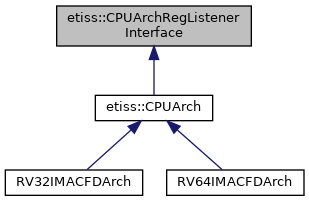allows to inform plugins about changes to a register that is present in the cpu structure. More...
#include <CPUArch.h>

Public Member Functions | |
| virtual | ~CPUArchRegListenerInterface () |
| virtual const std::set< std::string > & | getListenerSupportedRegisters ()=0 |
Static Public Member Functions | |
| static void | signalChangedRegisterValue (ETISS_CPU *cpu, const char *registerName) |
| call this function to inform RegisterDevicePlugins about changed special register values. | |
Detailed Description
allows to inform plugins about changes to a register that is present in the cpu structure.
an architecture should provide information about configuration registers (e.g. special purpose registers) so that plugins may simulate additional hardware. if such a register value has changed the etiss::CPUArch implementation is required to call etiss::CPUArch::signalChangedRegisterValue(ETISS_CPU* cpu,const char * registerName).
Constructor & Destructor Documentation
◆ ~CPUArchRegListenerInterface()
|
virtual |
Definition at line 26 of file CPUArch.cpp.
Member Function Documentation
◆ getListenerSupportedRegisters()
|
pure virtual |
Implemented in RV32IMACFDArch, and RV64IMACFDArch.
◆ signalChangedRegisterValue()
|
static |
call this function to inform RegisterDevicePlugins about changed special register values.
call must be done by the architecture implementation!!!
example pseudo implementation: Instruction: write value 13 to special purpose register Y Translated code: YOURARCH_writeToSPR(cpu,Y,13); declaration of YOURARCH_writeToSPR: extern void YOURARCH_writeToSPR(ETISS_CPU*cpu,etiss_uint32 Y,etiss_uint32 X); implementation of YOURARCH_writeToSPR: void YOURARCH_writeToSPR(ETISS_CPU*cpu,etiss_uint32 Y,etiss_uint32 X){ set value of register first ((YOURARCH*)cpu)->Y = X; signal change CPUArch::signalChangedRegisterValue(cpu,"nameOfRegisterY"); // very important } alternatively void ETISS_signalChangedRegisterValue(ETISS_CPU* cpu,const char * registerName) may be used as a C function (e.g. call it directly from the translated code)
- Attention
- may only be called from within the etiss::CPUCore::execute() function.
- this function is not very performant. to improve performance a bit call etiss::VirtualStruct::Field::signalWrite() directly for the appropriate field. in general it must be avaioded to use listeners on registers that are frequently changed (e.g. general purpose registers, special purpose registers for flags of arithmetic operations, etc.
- See also
- CPUCore.cpp (implemented there)
- etiss/CPUArch.h
Definition at line 26 of file CPUCore.cpp.
References ETISS_CPU::_etiss_private_handle_, etiss::ERROR, etiss::CPUCore::getStruct(), etiss::VirtualStruct::Field::L, and etiss::log().
Referenced by ETISS_signalChangedRegisterValue().


The documentation for this class was generated from the following files:
- /home/runner/work/etiss/etiss/include/etiss/CPUArch.h
- /home/runner/work/etiss/etiss/src/CPUArch.cpp
- /home/runner/work/etiss/etiss/src/CPUCore.cpp